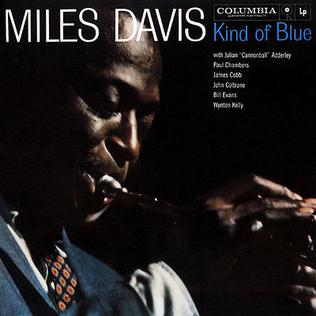
Kind of Blue is the fifth studio album released on Columbia, and twenty-eighth overall, by the American jazz musician, trumpeter, composer, and bandleader Miles Davis. It was recorded on March 2 and April 22, 1959, at Columbia's 30th Street Studio in New York City, and released on August 17 of that same year by Columbia Records. For the recording, Davis led a sextet featuring saxophonists John Coltrane and Julian "Cannonball" Adderley, pianist Bill Evans, bassist Paul Chambers, and drummer Jimmy Cobb, with new band pianist Wynton Kelly appearing on one track – "Freddie Freeloader" – in place of Evans.

Henry "Hank" Mobley was an American tenor saxophonist and composer. Mobley was described by Leonard Feather as the "middleweight champion of the tenor saxophone", a metaphor used to describe his tone, that was neither as aggressive as John Coltrane nor as mellow as Lester Young, and his style that was laid-back, subtle and melodic, especially in contrast with players such as Coltrane and Sonny Rollins. The critic Stacia Proefrock claimed him "one of the most underrated musicians of the bop era." Mobley's compositions include "Double Exposure", "Soul Station", and "Dig Dis".

Attilio Joseph "Teo" Macero was an American jazz saxophonist, composer, and record producer. He was a producer at Columbia Records for twenty years. Macero produced Miles Davis' Bitches Brew and Dave Brubeck's Time Out, two of the best-selling and most influential jazz albums of all time. Macero was known for his innovative use of editing and tape manipulation unprecedented in jazz and proving influential on subsequent fusion, experimental rock, electronica, post-punk, no wave, and acid jazz.
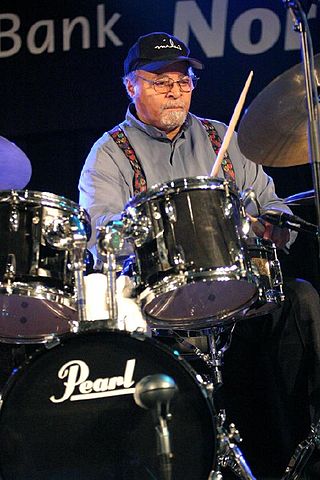
Wilbur James "Jimmy" Cobb was an American jazz drummer. He was part of Miles Davis's First Great Sextet. At the time of his death, he had been the Sextet's last surviving member for nearly thirty years. He was awarded an NEA Jazz Masters Fellowship in 2009.
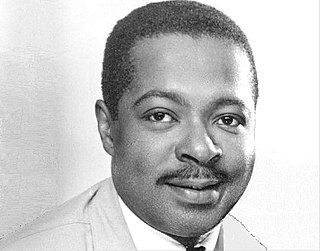
Wynton Charles Kelly was an American jazz pianist and composer. He is known for his lively, blues-based playing and as one of the finest accompanists in jazz. He began playing professionally at the age of 12 and was pianist on a No. 1 R&B hit at the age of 16. His recording debut as a leader occurred three years later, around the time he started to become better known as an accompanist to singer Dinah Washington, and as a member of trumpeter Dizzy Gillespie's band. This progress was interrupted by two years in the United States Army, after which Kelly worked again with Washington and Gillespie, and played with other leaders. Over the next few years, these included instrumentalists Cannonball Adderley, John Coltrane, Hank Mobley, Wes Montgomery, and Sonny Rollins, and vocalists Betty Carter, Billie Holiday, and Abbey Lincoln.

Seven Steps to Heaven is the eighth studio album on Columbia Records by jazz musician Miles Davis, released in 1963, catalogue CL 2051 and CS 8851 in stereo. Recorded at Columbia's 30th Street Studios in Manhattan, and at Columbia Studios in Los Angeles, in sessions recorded in April of 1963, and May of 1963. It presents the Miles Davis Quintet in transition, with the New York session introducing the rhythm section of Herbie Hancock, Ron Carter and Tony Williams, who would become Davis' regular sidemen for the next five years. Upon release, the album was Davis' most successful on the Billboard pop LPs chart up to that point, peaking at number 62.

Coltrane Jazz is the sixth studio album by jazz musician John Coltrane. It was released in early 1961 on Atlantic Records. Most of the album features Coltrane playing with his former Miles Davis bandmates, pianist Wynton Kelly, bassist Paul Chambers and drummer Jimmy Cobb during two sessions in November and December, 1959. The exception is the track "Village Blues", which was recorded October 21, 1960. "Village Blues" comes from the first recording session featuring Coltrane playing with pianist McCoy Tyner and drummer Elvin Jones, who toured and recorded with Coltrane as part of his celebrated "classic quartet" from 1960 to 1965.

The Complete Columbia Recordings of Miles Davis with John Coltrane is a box set featuring jazz musicians Miles Davis and John Coltrane. It is the first box set in a series of eight from Columbia/Legacy compiling Davis's work for Columbia Records, and includes never-before-released alternate takes, omissions of other musicians, musician comments, false starts and a first version of compositions, some of which have made it to the 50th Anniversary 2-disc CD version of Kind of Blue. Originally issued on April 11, 2000, in a limited-edition metal slipcase, it was reissued in 2004 in an oversized book format. In conjunction with Sony, Mosaic Records released the 9-LP set.

Circle in the Round is a 1979 compilation album by jazz musician Miles Davis. It compiled outtakes from sessions across fifteen years of Davis's career that, with one exception, had been previously unreleased. All of its tracks have since been made available on album reissues and posthumous box sets.
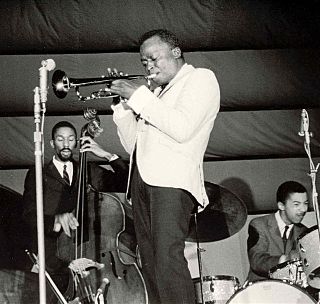
The Miles Davis Quintet was an American jazz band from 1955 to early 1969 led by Miles Davis. The quintet underwent frequent personnel changes toward its metamorphosis into a different ensemble in 1969. Most references pertain to two distinct and relatively stable bands: the First Great Quintet from 1955 to 1959, and the Second Great Quintet from late 1964 to early 1969, Davis being the only constant throughout.

1958 Miles is a compilation album by American jazz musician Miles Davis, released in 1974 on CBS/Sony. Recording sessions for tracks that appear on the album took place on May 26, 1958, at Columbia's 30th Street Studio and September 9, 1958, at the Plaza Hotel in New York City. 1958 Miles consists of three songs featured on side two of the LP album Jazz Track, which was released in November 1959, one song from the same session not appearing in the album, and three recordings from Davis' live performance at the Plaza Hotel with his ensemble sextet. The recording date at 30th Street Studio served as the first documented session to feature pianist Bill Evans performing in Davis' group.
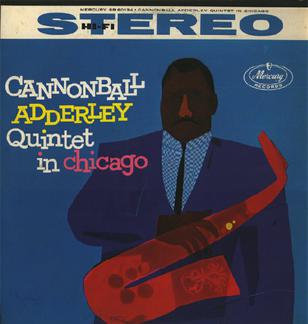
Cannonball Adderley Quintet in Chicago is an album by jazz saxophonist Cannonball Adderley, his final release on the Mercury label, featuring performances by Adderley with John Coltrane, Wynton Kelly, Paul Chambers and Jimmy Cobb.

Wynton Kelly! is an album by jazz pianist Wynton Kelly released on the Vee-Jay label featuring performances by Kelly with Paul Chambers or Sam Jones and Jimmy Cobb recorded in 1961. Additional performances from these sessions were released as Someday My Prince Will Come.

Someday My Prince Will Come is an album by jazz pianist Wynton Kelly featuring performances by Kelly with Paul Chambers or Sam Jones and Jimmy Cobb recorded in 1961 and one track with Lee Morgan and Wayne Shorter from 1959 released by the Vee-Jay label in 1961. Additional performances from these sessions were released as Wynton Kelly!.

Super Hits is a greatest hits album from Miles Davis. Released in 2001, it reached #22 on Billboard's Jazz Albums chart.

The Essential Miles Davis is a 2-CD compilation album by Miles Davis released by Columbia Legacy on May 15, 2001. It belongs to Sony Music Entertainment's "The Essential" series, not to the series "Essentials", established by WEA International, and was released as part of Sony's Miles 75 Anniversary program. In 2008, The Essential Miles Davis 3.0 was released as a limited edition album featuring a bonus third disc that added five more songs to the original track list.

Quiet Nights is a studio album by American jazz trumpeter Miles Davis, and his fourth album collaboration with arranger and conductor Gil Evans, released in 1963 on Columbia Records, catalogue CL 2106 and CS 8906 in stereo. Recorded mostly at Columbia's 30th Street Studios in Manhattan, it is the final album by Davis and Evans.

Miles Davis' Greatest Hits is a compilation album by Miles Davis originally released in 1969 and re-released in 1997 on CD with different recordings of tracks 3, 4 and 8.
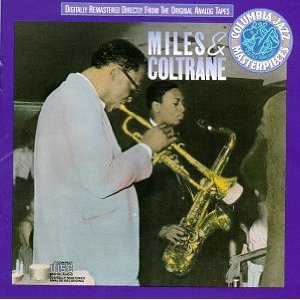
Miles & Coltrane is a live album by American jazz musician Miles Davis, released in 1988 by Columbia Records. The music was recorded at two different shows—one on July 4, 1958, at the Newport Jazz Festival, and one from October 27, 1955, in New York. The tracks have been digitally remastered directly from the original analog tapes.
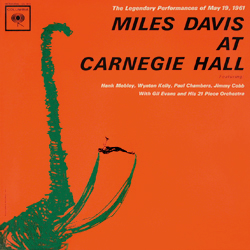
Miles Davis at Carnegie Hall: The Legendary Performances of May 19, 1961 is a live album by American jazz musician Miles Davis originally released by Columbia in 1962.



















